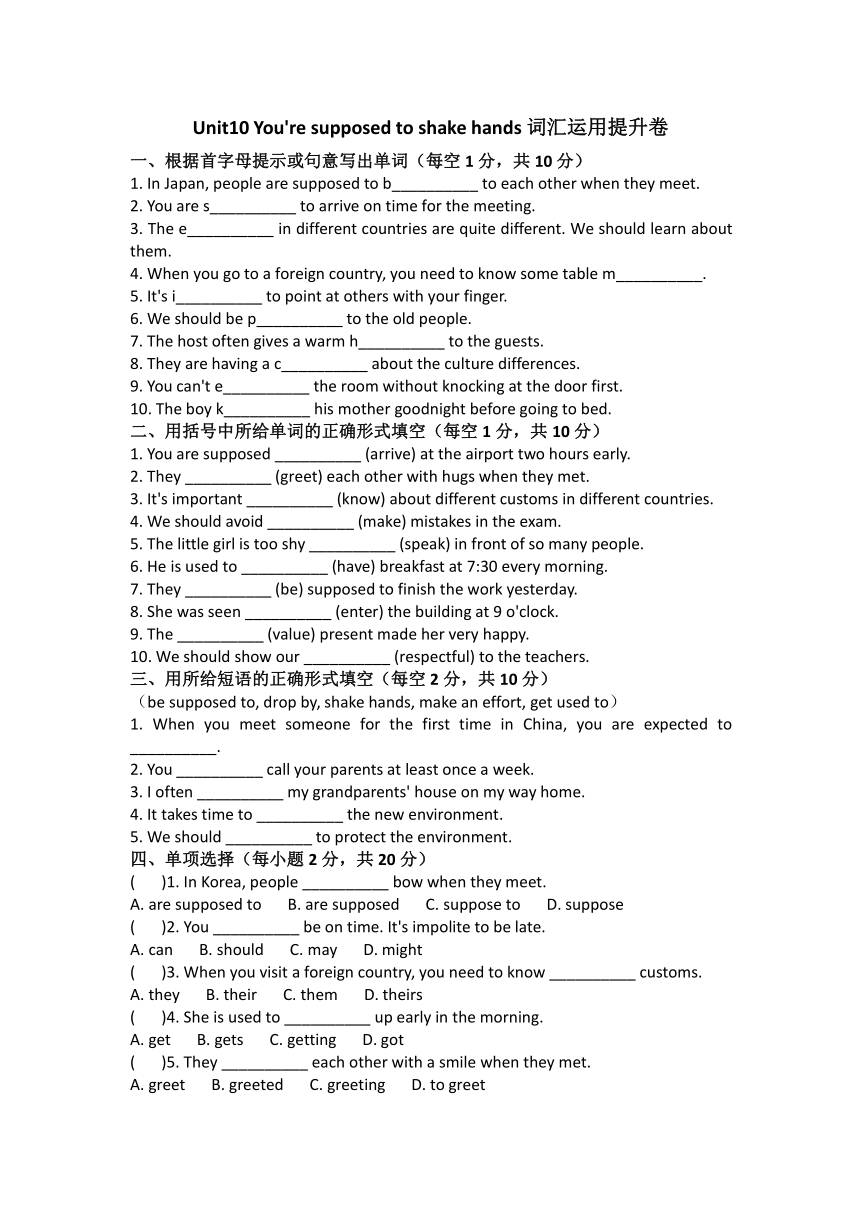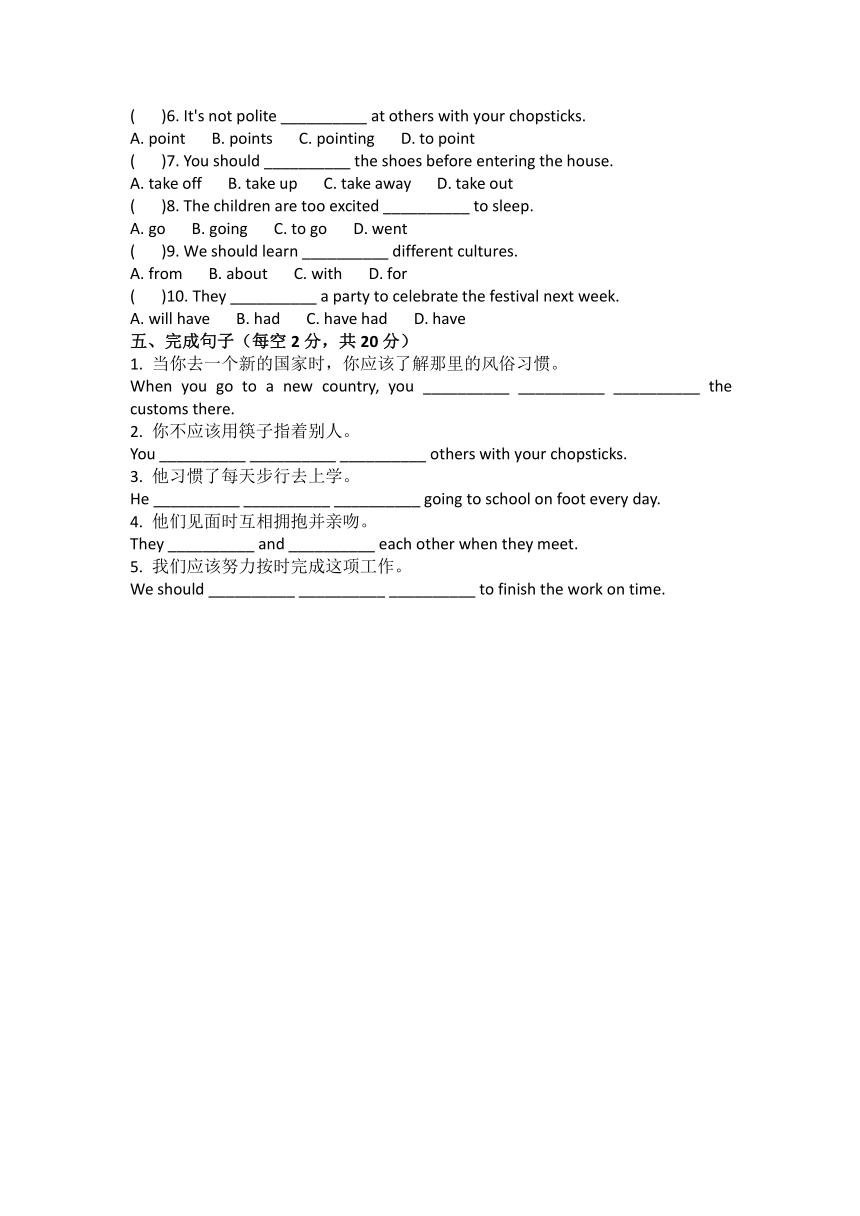Unit 10 You're supposed to shake hands. 词汇运用练习(含解析)2024-2025学年人教版英语九年级全册
文档属性
| 名称 | Unit 10 You're supposed to shake hands. 词汇运用练习(含解析)2024-2025学年人教版英语九年级全册 |  | |
| 格式 | docx | ||
| 文件大小 | 21.1KB | ||
| 资源类型 | 教案 | ||
| 版本资源 | 人教新目标(Go for it)版 | ||
| 科目 | 英语 | ||
| 更新时间 | 2025-03-11 14:21:43 | ||
图片预览


文档简介
Unit10 You're supposed to shake hands词汇运用提升卷
一、根据首字母提示或句意写出单词(每空1分,共10分)
1. In Japan, people are supposed to b__________ to each other when they meet.
2. You are s__________ to arrive on time for the meeting.
3. The e__________ in different countries are quite different. We should learn about them.
4. When you go to a foreign country, you need to know some table m__________.
5. It's i__________ to point at others with your finger.
6. We should be p__________ to the old people.
7. The host often gives a warm h__________ to the guests.
8. They are having a c__________ about the culture differences.
9. You can't e__________ the room without knocking at the door first.
10. The boy k__________ his mother goodnight before going to bed.
二、用括号中所给单词的正确形式填空(每空1分,共10分)
1. You are supposed __________ (arrive) at the airport two hours early.
2. They __________ (greet) each other with hugs when they met.
3. It's important __________ (know) about different customs in different countries.
4. We should avoid __________ (make) mistakes in the exam.
5. The little girl is too shy __________ (speak) in front of so many people.
6. He is used to __________ (have) breakfast at 7:30 every morning.
7. They __________ (be) supposed to finish the work yesterday.
8. She was seen __________ (enter) the building at 9 o'clock.
9. The __________ (value) present made her very happy.
10. We should show our __________ (respectful) to the teachers.
三、用所给短语的正确形式填空(每空2分,共10分)
(be supposed to, drop by, shake hands, make an effort, get used to)
1. When you meet someone for the first time in China, you are expected to __________.
2. You __________ call your parents at least once a week.
3. I often __________ my grandparents' house on my way home.
4. It takes time to __________ the new environment.
5. We should __________ to protect the environment.
四、单项选择(每小题2分,共20分)
( )1. In Korea, people __________ bow when they meet.
A. are supposed to B. are supposed C. suppose to D. suppose
( )2. You __________ be on time. It's impolite to be late.
A. can B. should C. may D. might
( )3. When you visit a foreign country, you need to know __________ customs.
A. they B. their C. them D. theirs
( )4. She is used to __________ up early in the morning.
A. get B. gets C. getting D. got
( )5. They __________ each other with a smile when they met.
A. greet B. greeted C. greeting D. to greet
( )6. It's not polite __________ at others with your chopsticks.
A. point B. points C. pointing D. to point
( )7. You should __________ the shoes before entering the house.
A. take off B. take up C. take away D. take out
( )8. The children are too excited __________ to sleep.
A. go B. going C. to go D. went
( )9. We should learn __________ different cultures.
A. from B. about C. with D. for
( )10. They __________ a party to celebrate the festival next week.
A. will have B. had C. have had D. have
五、完成句子(每空2分,共20分)
1. 当你去一个新的国家时,你应该了解那里的风俗习惯。
When you go to a new country, you __________ __________ __________ the customs there.
2. 你不应该用筷子指着别人。
You __________ __________ __________ others with your chopsticks.
3. 他习惯了每天步行去上学。
He __________ __________ __________ going to school on foot every day.
4. 他们见面时互相拥抱并亲吻。
They __________ and __________ each other when they meet.
5. 我们应该努力按时完成这项工作。
We should __________ __________ __________ to finish the work on time.
答案及解析
一、根据首字母提示或句意写出单词
1. bow 解析:在日本,人们见面时通常互相鞠躬,“bow”意为“鞠躬”。
2. supposed 解析:“be supposed to do sth.”是固定用法,表示“应该做某事”。
3. customs 解析:不同国家的习俗有很大差异,“custom”表示“习俗”,这里要用复数形式。
4. manners 解析:“table manners”是固定短语,意为“餐桌礼仪”。
5. impolite 解析:用手指指着别人是不礼貌的,“impolite”表示“不礼貌的”。
6. polite 解析:我们应该对老人有礼貌,“polite”意为“有礼貌的”。
7. hug 解析:主人常常给客人一个热情的拥抱,“give a hug”表示“给一个拥抱”。
8. conversation 解析:他们正在进行一场关于文化差异的对话,“have a conversation”表示“进行一场对话”。
9. enter 解析:你不能不敲门就进入房间,“enter”意为“进入”。
10. kissed 解析:男孩上床睡觉前亲吻他的妈妈道晚安,这里描述过去的动作,要用过去式“kissed”。
二、用括号中所给单词的正确形式填空
1. to arrive 解析:“be supposed to do sth.”表示“应该做某事”,所以此处用“to arrive”。
2. greeted 解析:根据“when they met”可知,该句时态为一般过去时,所以用“greet”的过去式“greeted”。
3. to know 解析:“It's + adj. + to do sth.”是固定句型,表示“做某事是……的”,所以用“to know”。
4. making 解析:“avoid doing sth.”表示“避免做某事”,所以用“make”的动名词形式“making”。
5. to speak 解析:“too...to...”表示“太……而不能……”,所以用“to speak”。
6. having 解析:“be used to doing sth.”表示“习惯于做某事”,所以用“have”的动名词形式“having”。
7. were 解析:“be supposed to do sth.”,根据“yesterday”可知,该句时态为一般过去时,主语是“They”,所以用“were”。
8. to enter 解析:“see sb. do sth.”的被动语态是“sb. be seen to do sth.”,所以用“to enter”。
9. valuable 解析:修饰名词“present”要用形容词,“value”的形容词是“valuable”,表示“有价值的”。
10. respect 解析:“show one's respect to sb.”表示“向某人表示尊重”,这里要用名词“respect”。
三、用所给短语的正确形式填空
1. shake hands 解析:在中国,第一次见面时通常会握手,“shake hands”表示“握手”。
2. are supposed to 解析:你应该每周至少给你的父母打一次电话,“be supposed to do sth.”表示“应该做某事”。
3. drop by 解析:我经常在回家的路上顺便拜访我祖父母的家,“drop by”表示“顺便拜访”。
4. get used to 解析:适应新环境需要时间,“get used to”表示“适应”。
5. make an effort 解析:我们应该努力保护环境,“make an effort”表示“努力”。
四、单项选择
1. A 解析:“be supposed to do sth.”表示“应该做某事”,是固定用法,所以选A。
2. B 解析:根据“It's impolite to be late.”可知,这里表示“应该”按时,“should”表示“应该”,符合语境,选B。
3. B 解析:修饰名词“customs”要用形容词性物主代词,“their”表示“他们的”,选B。
4. C 解析:“be used to doing sth.”表示“习惯于做某事”,所以选C。
5. B 解析:根据“when they met”可知,该句时态为一般过去时,所以用“greet”的过去式“greeted”,选B。
6. D 解析:“It's not polite to do sth.”表示“做某事是不礼貌的”,所以用“to point”,选D。
7. A 解析:“take off”表示“脱下”;“take up”表示“占据,开始从事”;“take away”表示“拿走”;“take out”表示“取出”。根据语境,进入房子前应该脱下鞋子,选A。
8. C 解析:“too...to...”表示“太……而不能……”,所以选C。
9. B 解析:“learn about”表示“了解”,这里表示了解不同的文化,选B。
10. A 解析:根据“next week”可知,该句时态为一般将来时,“will + 动词原形”构成一般将来时,所以选A。
五、完成句子
1. are supposed to learn 解析:“be supposed to do sth.”表示“应该做某事”,“learn about”表示“了解”。
2. aren't supposed to point 解析:“be not supposed to do sth.”表示“不应该做某事”,“point at”表示“指着”。
3. is used to 解析:“be used to doing sth.”表示“习惯于做某事”。
4. hug; kiss 解析:“hug”表示“拥抱”,“kiss”表示“亲吻”。
5. make an effort 解析:“make an effort”表示“努力”。
一、根据首字母提示或句意写出单词(每空1分,共10分)
1. In Japan, people are supposed to b__________ to each other when they meet.
2. You are s__________ to arrive on time for the meeting.
3. The e__________ in different countries are quite different. We should learn about them.
4. When you go to a foreign country, you need to know some table m__________.
5. It's i__________ to point at others with your finger.
6. We should be p__________ to the old people.
7. The host often gives a warm h__________ to the guests.
8. They are having a c__________ about the culture differences.
9. You can't e__________ the room without knocking at the door first.
10. The boy k__________ his mother goodnight before going to bed.
二、用括号中所给单词的正确形式填空(每空1分,共10分)
1. You are supposed __________ (arrive) at the airport two hours early.
2. They __________ (greet) each other with hugs when they met.
3. It's important __________ (know) about different customs in different countries.
4. We should avoid __________ (make) mistakes in the exam.
5. The little girl is too shy __________ (speak) in front of so many people.
6. He is used to __________ (have) breakfast at 7:30 every morning.
7. They __________ (be) supposed to finish the work yesterday.
8. She was seen __________ (enter) the building at 9 o'clock.
9. The __________ (value) present made her very happy.
10. We should show our __________ (respectful) to the teachers.
三、用所给短语的正确形式填空(每空2分,共10分)
(be supposed to, drop by, shake hands, make an effort, get used to)
1. When you meet someone for the first time in China, you are expected to __________.
2. You __________ call your parents at least once a week.
3. I often __________ my grandparents' house on my way home.
4. It takes time to __________ the new environment.
5. We should __________ to protect the environment.
四、单项选择(每小题2分,共20分)
( )1. In Korea, people __________ bow when they meet.
A. are supposed to B. are supposed C. suppose to D. suppose
( )2. You __________ be on time. It's impolite to be late.
A. can B. should C. may D. might
( )3. When you visit a foreign country, you need to know __________ customs.
A. they B. their C. them D. theirs
( )4. She is used to __________ up early in the morning.
A. get B. gets C. getting D. got
( )5. They __________ each other with a smile when they met.
A. greet B. greeted C. greeting D. to greet
( )6. It's not polite __________ at others with your chopsticks.
A. point B. points C. pointing D. to point
( )7. You should __________ the shoes before entering the house.
A. take off B. take up C. take away D. take out
( )8. The children are too excited __________ to sleep.
A. go B. going C. to go D. went
( )9. We should learn __________ different cultures.
A. from B. about C. with D. for
( )10. They __________ a party to celebrate the festival next week.
A. will have B. had C. have had D. have
五、完成句子(每空2分,共20分)
1. 当你去一个新的国家时,你应该了解那里的风俗习惯。
When you go to a new country, you __________ __________ __________ the customs there.
2. 你不应该用筷子指着别人。
You __________ __________ __________ others with your chopsticks.
3. 他习惯了每天步行去上学。
He __________ __________ __________ going to school on foot every day.
4. 他们见面时互相拥抱并亲吻。
They __________ and __________ each other when they meet.
5. 我们应该努力按时完成这项工作。
We should __________ __________ __________ to finish the work on time.
答案及解析
一、根据首字母提示或句意写出单词
1. bow 解析:在日本,人们见面时通常互相鞠躬,“bow”意为“鞠躬”。
2. supposed 解析:“be supposed to do sth.”是固定用法,表示“应该做某事”。
3. customs 解析:不同国家的习俗有很大差异,“custom”表示“习俗”,这里要用复数形式。
4. manners 解析:“table manners”是固定短语,意为“餐桌礼仪”。
5. impolite 解析:用手指指着别人是不礼貌的,“impolite”表示“不礼貌的”。
6. polite 解析:我们应该对老人有礼貌,“polite”意为“有礼貌的”。
7. hug 解析:主人常常给客人一个热情的拥抱,“give a hug”表示“给一个拥抱”。
8. conversation 解析:他们正在进行一场关于文化差异的对话,“have a conversation”表示“进行一场对话”。
9. enter 解析:你不能不敲门就进入房间,“enter”意为“进入”。
10. kissed 解析:男孩上床睡觉前亲吻他的妈妈道晚安,这里描述过去的动作,要用过去式“kissed”。
二、用括号中所给单词的正确形式填空
1. to arrive 解析:“be supposed to do sth.”表示“应该做某事”,所以此处用“to arrive”。
2. greeted 解析:根据“when they met”可知,该句时态为一般过去时,所以用“greet”的过去式“greeted”。
3. to know 解析:“It's + adj. + to do sth.”是固定句型,表示“做某事是……的”,所以用“to know”。
4. making 解析:“avoid doing sth.”表示“避免做某事”,所以用“make”的动名词形式“making”。
5. to speak 解析:“too...to...”表示“太……而不能……”,所以用“to speak”。
6. having 解析:“be used to doing sth.”表示“习惯于做某事”,所以用“have”的动名词形式“having”。
7. were 解析:“be supposed to do sth.”,根据“yesterday”可知,该句时态为一般过去时,主语是“They”,所以用“were”。
8. to enter 解析:“see sb. do sth.”的被动语态是“sb. be seen to do sth.”,所以用“to enter”。
9. valuable 解析:修饰名词“present”要用形容词,“value”的形容词是“valuable”,表示“有价值的”。
10. respect 解析:“show one's respect to sb.”表示“向某人表示尊重”,这里要用名词“respect”。
三、用所给短语的正确形式填空
1. shake hands 解析:在中国,第一次见面时通常会握手,“shake hands”表示“握手”。
2. are supposed to 解析:你应该每周至少给你的父母打一次电话,“be supposed to do sth.”表示“应该做某事”。
3. drop by 解析:我经常在回家的路上顺便拜访我祖父母的家,“drop by”表示“顺便拜访”。
4. get used to 解析:适应新环境需要时间,“get used to”表示“适应”。
5. make an effort 解析:我们应该努力保护环境,“make an effort”表示“努力”。
四、单项选择
1. A 解析:“be supposed to do sth.”表示“应该做某事”,是固定用法,所以选A。
2. B 解析:根据“It's impolite to be late.”可知,这里表示“应该”按时,“should”表示“应该”,符合语境,选B。
3. B 解析:修饰名词“customs”要用形容词性物主代词,“their”表示“他们的”,选B。
4. C 解析:“be used to doing sth.”表示“习惯于做某事”,所以选C。
5. B 解析:根据“when they met”可知,该句时态为一般过去时,所以用“greet”的过去式“greeted”,选B。
6. D 解析:“It's not polite to do sth.”表示“做某事是不礼貌的”,所以用“to point”,选D。
7. A 解析:“take off”表示“脱下”;“take up”表示“占据,开始从事”;“take away”表示“拿走”;“take out”表示“取出”。根据语境,进入房子前应该脱下鞋子,选A。
8. C 解析:“too...to...”表示“太……而不能……”,所以选C。
9. B 解析:“learn about”表示“了解”,这里表示了解不同的文化,选B。
10. A 解析:根据“next week”可知,该句时态为一般将来时,“will + 动词原形”构成一般将来时,所以选A。
五、完成句子
1. are supposed to learn 解析:“be supposed to do sth.”表示“应该做某事”,“learn about”表示“了解”。
2. aren't supposed to point 解析:“be not supposed to do sth.”表示“不应该做某事”,“point at”表示“指着”。
3. is used to 解析:“be used to doing sth.”表示“习惯于做某事”。
4. hug; kiss 解析:“hug”表示“拥抱”,“kiss”表示“亲吻”。
5. make an effort 解析:“make an effort”表示“努力”。
同课章节目录
- Unit 1 How can we become good learners.
- Section A
- Section B
- Unit 2 I think that mooncakes are delicious!
- Section A
- Section B
- Unit 3 Could you please tell me where the restroom
- Section A
- Section B
- Unit 4 I used to be afraid of the dark.
- Section A
- Section B
- Unit 5 What are the shirts made of?
- Section A
- Section B
- Review of Units 1-5
- Unit 6 When was it invented?
- Section A
- Section B
- Unit 7 Teenagers should be allowed to choose their
- Section A
- Section B
- Unit 8 It must belong to Carla.
- Section A
- Section B
- Unit 9 I like music that I can dance to.
- Section A
- Section B
- Unit 10 You're supposed to shake hands.
- Section A
- Section B
- Review of Units 6-10
- Unit 11 Sad movies make me cry.
- Section A
- Section B
- Unit 12 Life is full of the unexpected
- Section A
- Section B
- Unit 13 We're trying to save the earth!
- Section A
- Section B
- Unit 14 I remember meeting all of you in Grade 7.
- Section A
- Section B
- Review of Units 11-14
